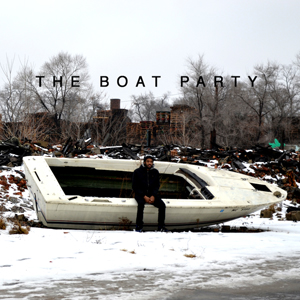Kyle Hall The Boat Party
First emerging as an unfeasibly brilliant teenager born in Detroit and raised on its techno, […]

First emerging as an unfeasibly brilliant teenager born in Detroit and raised on its techno, Kyle Hall became revered for his seemingly innate grasp of the moods and fluctuations of his hometown’s music. Since 2010, however, the DJ/producer’s release schedule has almost come to a halt—aside from a recent 5″ that dropped on Record Store Day 2013, The Boat Party is Hall’s first solo release in two years. That said, his recent low-key production presence testifies to an intense devotion to the sound he loves; when he’s not DJing, working as Funkinevil with London’s Funkineven, or collaborating with fellow Motor City native Kero, Hall spends time running his Wild Oats label at breakneck speed.
Confidently travelling its unorthodox route, The Boat Party begins in media res, so to speak—seemingly midway through a track—as a watery chime slopes through a leaning stumble of drums. This wouldn’t be such a remarkable beginning if the tune didn’t occasionally fizzle out briefly before resuming its march. “Dr Crunch” takes a totally different approach; it’s a strumming, carbonated filter-house track which morphs and distorts itself continually. Like much of Hall’s sound, it is tantalizing; one rarely feels like they’re quite in the same space as the track, as though a barrier of fluid density exists between the listener and the full presence of the noise. Disconcertingly, it’s just a battered, echoing kick drum that stays in the forefront the whole time.
An ambiguous feeling towards the physicality of its sounds characterizes The Boat Party. The angsty interaction between software and hardware is something Hall has expressed an interest in before, and it certainly feels like he explores—and maybe even exploits—this relationship throughout most of the album, with pleasingly earthy and excitingly futuristic results. The listener is brought within range of the clean intensity of the bassbin during “Spoof,” as skittering, scratching percussion peels over a swollen kick. A smothered murmur of melody breathes out a niggling, introspective confusion while the beat grows preoccupied by its own instability. “Flemmenup” is where Hall abandons melody entirely, spending the five-minute MPC jam shredding open-mouthed syllables up against the drums.
On “Crushed,” a chunky, purposeful beat booms and clatters about, and for a moment, it’s unclear whether The Boat Party is ready to play nice yet. Suddenly, warm liquid gold flows into the track, as a syrupy croon is sampled and re-processed into a brain-flooding pleasure rush that feels neither synthetic nor organic. Like 2011’s “Down!,” “Crushed” is a cut of elegantly slanted deep house with a fascinating attention deficit. Hall arranges its simple mix of elements with a rare sensitivity, teasing out the most haunting and engaging powers of the sampler.
Tempos reach far above the level where Hall generally works on “Finnapop,” as the producer moves his composition along with a vast and futuristic ghetto-tech bounce. The back and forth between its thick, stamping bass and shuddering wallop is dramatic and visceral. Penultimate track “Grungy Gloops” recalls Hall’s first release (2007’s “Plastik-Ambash” for Omar-S’ FXHE label) with its clenched shuffle of drums, intriguingly broken synths, and overbearing digital distortion, the latter of which also demonstrates just how close the Detroit artist’s musical DNA is to that of the very much UK-based Actress. The album closes with “Measure 2 Measure,” another choppy, vaguely French house-sounding banger with notes of sadness. It’s like that uncontrollable foot tap one gets after returning from the club, when fading peaks of elation from the dancefloor are still bouncing around an exhausted body.
Hall’s complete refusal of the delineated, predictable pace of so much dance music is as refreshing as always, and it’s executed here with a deft and intuitive touch. There is no major sense of progression with The Boat Party, but none is really needed, as Hall has always worked on the boundary of what we understand most house and techno to try to do. His debut LP memorably embraces the tension in dance music that is often left unexplored, recognizing that behind every gratifying combination of soul and groove lurks the threat of a stunted, arrhythmic discordance.

